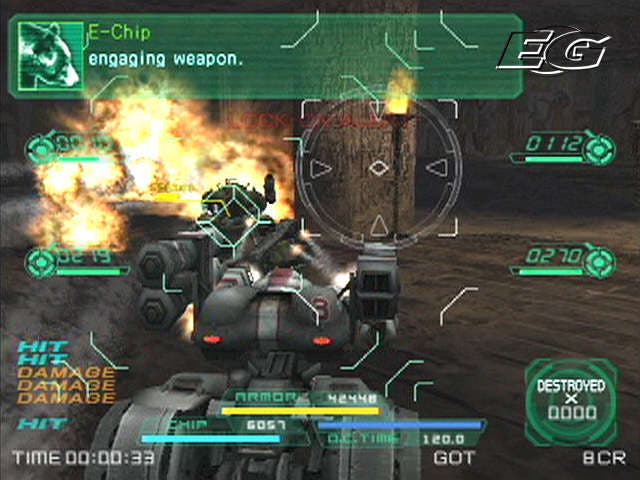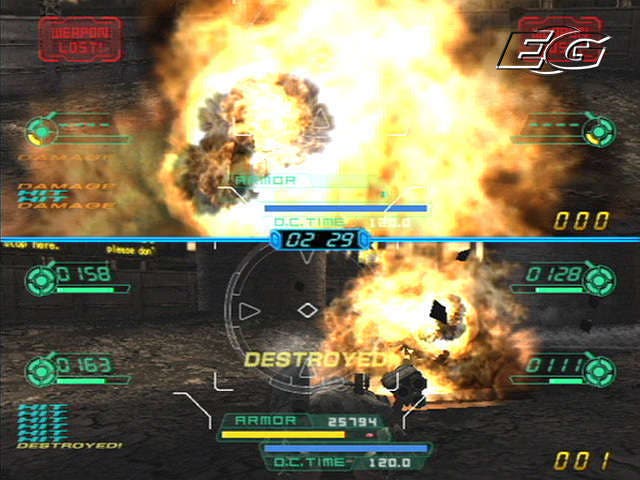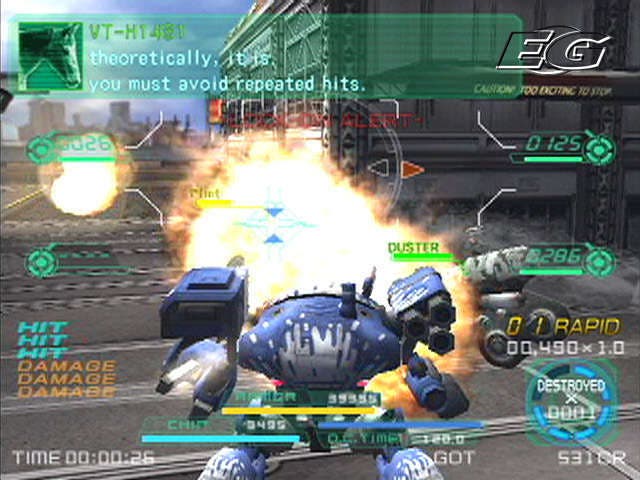S.L.A.I. Steel Lancer Arena International
Konami unleashes robot death. In a nice way.
As Albert Einstein would have probably said (if he wasn't, you know, dead), game ideas should be as simple as possible, and no simpler. When an idea is simple, yet well executed, you can end up with awe-inspiring things-of-legend, which continue to draw whimpers of delight from folk for years. But if a game crosses that fine line into the too-simple, it becomes a forgettable, put-down-in-half-an-hour outcast.
This then. This S.L.A.I. It's something in-between.
It's an arena game that involves running, jumping and blasting the living toiletries out of chums, as becomes obvious when you decode the name: Steel Lancer Arena International. It wobbles and clunks its way unsteadily along the line we've mentioned, and occasionally plonks a big metal claw the wrong side of it.
Along with the aforementioned runny-jumpy-blasty, you've got network options to allow the unleashing of metal death on insomniac Americans. It features a range of highly death-equippable futuristic mini-metal-gear-like so-called SV models; a large but underwhelming single-player mode, destined to be largely ignored; and a good-sized but barely more-than-whelming networked multiplayer mode. This is all wrapped in enough truly lovely post-cyberpunk gift-wrapping that you occasionally wish they'd shown quite as much love to the main game as they have to their menu systems and array of cute loading screens.
But, cute packaging is not quite enough; as I've already said, it's all about the delivery.
Regrettably, the biggest element of S.L.A.I. is the single-player game; regrettably because, frankly, if you buy a game like this it's because you want to frag real people across an area of the Internet the size of Belgium.

In the one-up mode, you are given control of an upgradeable 'chip' and then lease or buy a psycho stalkbot to build around it, take into the OMG Virtual Reality arena, and do explody battles within servers hosting a pretty 'cyberspace' landscape, backronymically betitled the 'Hyper Advanced Virtual Environment Network'. Or HAVEN, presumably.
Within this cyberpornographic vision of a future Internet devoted entirely to blowing up robots, you may buy and sell luxury options and dash-mounted trimmings for your beloved instrument of death so that they'll be ready to rumble again in time for the next virtual-murderous outing; fortunately, there is an odd but useful non-linearity though the passage of time, which means that you can do this without having to worry a great deal about schedules and other micromanagement trivia. In fact, you can fight whenever you want to really, and it always seems to be time for the next fight.
But S.L.A.I. doesn't want you to always be fighting; occasionally it's in your best interests to go wandering the Gallium Arsenide corridors of the online world, expansive as they are, just so the programmers can show you the attention they've lavished on everything except the gameplay.
The Neuromantic world on offer is huge and gorgeous. It's stuffed full of cute features like chat rooms, random Windows-esque crashes, frag-lag, and other coy simulacra of network effects to evoke the spirit of the guts of a regional gaming server. It's a cute way of luring players into a coherent universe. It's also clear that the developers spent more effort on it than they needed to at the expense of the main gameplay, almost certainly because they wanted to, because it was fun.

HAVEN also offers a soul-destroyingly endless series of tutorials; but the game is simple enough that I doubt anybody will get more than halfway through, thinking "flip this" and move on to the exam. There's also oodles of other stuff; machinists, configuration zones, mechanics, botmakers, manufacturers, music vendors, and loads of other great stuff.
It's bonkers fun to just meander around; yet however highly polished, the lovely informatic overload is not what it should be about. Unfortunately, it may well turn out to be what it's remembered for, because the one-player gameplay is forgettably bland.
Pre-match, the game provides you with the opportunity to put together thousands of potential deathbot-weapon combinations; specific modules can be then be further customised, but once you've made your choice, the game seems to ignore it. It's fast, stupid, bulky and gangly. Any pre-match strategy is irrelevant - either your robot is up to task or worthless. More bizarrely still, the actual play doesn't represent any of this beyond a simple win/death boolean. The game, for as fast and clumsy as it is, either leads to well-equipped and exceedingly powerful mechs, or ones that are just completely useless.
Good choice, you win. Bad choice, you're dead. The gameplay is completely unbalanced; if you get lucky, you will create an unstoppable mechadeath on your first go, and make fifty kills without taking so much as a graze on your undercarriage. This game is easy. The gameplay is fun, functional, and dare I say it, rather classically good, but challenging it isn't. That's why this game has to be played against meatspace denizens. Only then is anybody ever likely to put up a fight.

Netted up, its simplistic strafe-and-frag classic gameplay comes into its own. Evoking primordial memories of Armagetron LAN parties, the good aspects are multiplied and the bad become bearable. With three other players, it's possible to while away many hours in classic jump-and-shoot four-way rumbles, while others queue up outside the gate for the privilege. This one-in-one-out mechanism serves the game beautifully; there was no lag or performance degradation at any point.
Online is S.L.A.I.'s raison d'etre. Easy play becomes classic fun, but only when facing off against multiple opponents.
Few games offer quite as much, yet in as shallow a fashion as S.L.A.I. From the large-yet-dull single-player mode, to the simple-but-gleeful multiplayer, and the glorious presentation of HAVEN, this game is something of a triumph of style over substance. The look of the environments is varied, yet so-so in aesthetic, a bit blocky, definitely current-generation, daahling. Even the soundtrack is diverse and eclectic, and full of unexpected genre-pieces whilst still being unfulfilling.
It's this lack of depth which allows the cracks at the seams to gape somewhat. Tedious one-man combat with endless enemy-respawn, restrictive environments, and some truly shocking collision detection detract credibility from the one-player game to make it utterly ignorable.
Looking firmly along the line of simple-as-possible, it's clear that the developers, in focusing so much on the presentation of the HAVEN, rather than gameplay faults, have allowed it to stray too far into the bad half. For one player, this game, despite its expansiveness, has little to offer. But for some joyously venerable online mano-a-mano goodness, arena-based shoot-lovers will be missing a good 'un if they don't equip their shoulders with this one.
